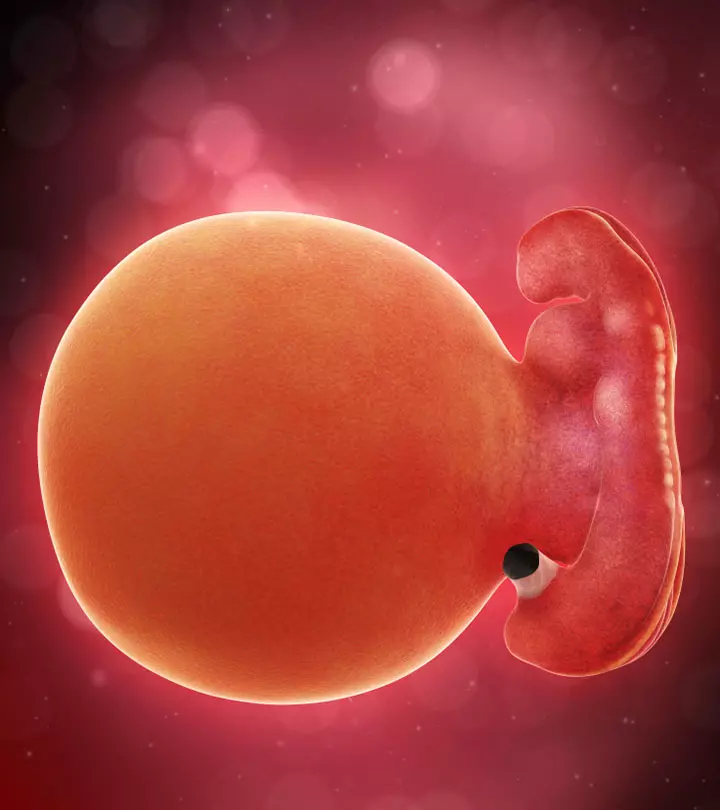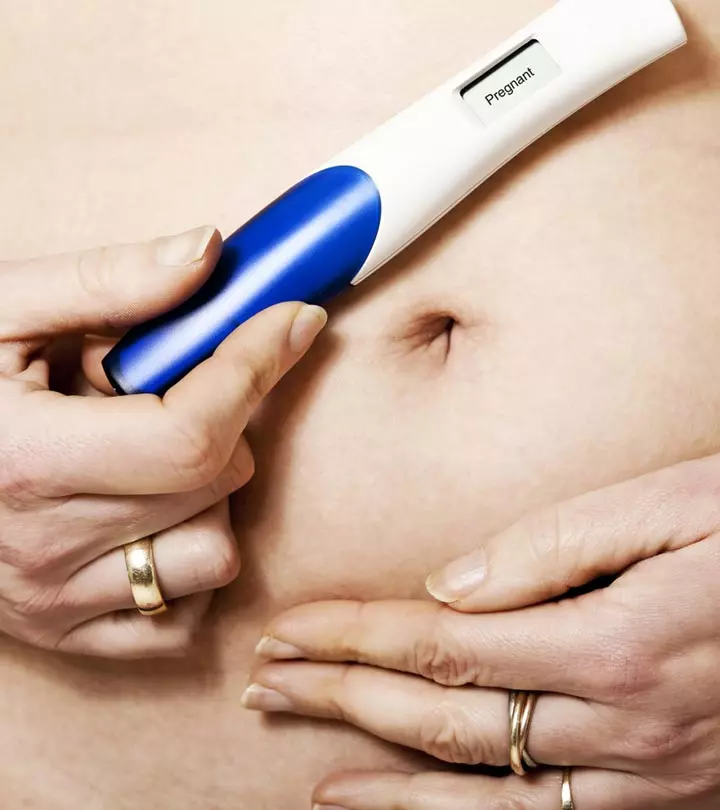
Image: Shutterstock
Once you are 5 weeks pregnant, you are at the beginning of the second month of pregnancy. The fifth week of pregnancy usually brings significant changes and developments. Your baby will experience rapid growth with the first organs starting to develop this week. The 5th week of pregnancy is also when you might get to know you are pregnant; moreover, you may start to notice some physical and emotional changes by the end of this week (1).

Read further to explore changes, signs, developments, tips, and important points to note regarding week five of your pregnancy.
Key Pointers
- At week five of your pregnancy, you could begin experiencing early pregnancy signs such as morning sickness, fatigue, and tender breasts.
- Your baby’s major organs and systems develop rapidly, and their heartbeat initiates.
- During this pregnancy week, you should visit your physician, practice healthy eating, rest well, take prenatal vitamins, and avoid smoking and alcohol.
- If you notice any abnormal signs such as unbearable abdominal pain, severe vomiting, or vaginal bleeding, seek medical care immediately.
Your Body At Week Five
During this week, your belly may feel different, and you may sense that the pregnancy is just beginning.
The first sign of pregnancy is a missed period. If you plan to get a pregnancy test, this week could be the right time. Your hormones may be surging now, making you feel tired, anxious, or emotional. It would be wise to talk to your physician regarding your concerns (1).
Pregnancy Symptoms During Week Five
The swiftly rising pregnancy hormones may cause several 5-week pregnancy symptoms. Some of the signs that may start to appear during the 5th week of pregnancy are (1) (2):
- Spotting or bleeding: Some women experience light bleeding or spotting due to implantation, which happens six to twelve days after conception.
- Fatigue: Early pregnancy may make you feel tired without reason. Most women feel fatigued in this week of pregnancy.
- Breast tenderness: Hormonal changes early in pregnancy can make your breasts feel tender and heavy. Sore breasts are said to be one of the earliest symptoms of pregnancy (3).
- Morning sickness: You may feel nauseated and have the urge to vomit during the week. Morning sickness can occur anytime during the day.
- Cravings: Changes in hormone levels might lead to specific food aversions and cravings in some women during pregnancy.
- Changes in the sense of taste: A shift in pregnancy hormones might cause changes in taste. Some women experience a strange metallic taste in mouth during pregnancy.
- Changes in the sense of smell: A heightened sense of smell is a common sign of early pregnancy in many women.
- Mood changes: Mood swings and headaches could be seen in some women due to hormonal fluctuations. It may last for a few weeks after conception in some women, while others may experience it for the entire pregnancy.
- Bloating: Gastrointestinal symptoms such as bloating, constipation, indigestion, or heartburn could be seen in some women during the initial weeks of pregnancy.

- Frequent urination: A growing uterus may cause pressure on your bladder; hence you may feel the urge to urinate more frequently.
- Vaginal discharge: Some women could experience a thin, white discharge from the vagina during early pregnancy. However, if you have a colored, foul-smelling vaginal discharge accompanied by inflammation or irritation, you must consult your doctor.
The pregnancy symptoms at week five may vary, and no two expectant mothers may have the same symptoms in their pregnancies. However, if you feel the symptoms worsen with time, it is better to visit the doctor right away.
Faith, a blogger and a mom of two, says she experienced a plethora of emotions during the fifth week of her pregnancy. She explains, “I experienced dizziness, exhaustion, food cravings and aversions, leaking breasts, and more intense cramps than I experienced in my previous pregnancies. In general, all my symptoms were more intense in the second pregnancy when compared to the first one (i).”
Baby Development At Five Weeks
Your baby, now called an embryoiThe primary stage of human life formation within the womb , is burrowed in the uterus and covered by the amniotic saciThe water or fluid-filled sac within the womb necessary for the growth and development of the fetus . Your little one begins to grow rapidly, and most organs start to develop in this period. Other major developments in your baby during this week include (4) (5):
- The size of your baby this week is tiny, less than ¼ inch (approximately 2-3mm), and about the size of a sesame seed.
- Your baby’s tiny heart starts to beat. The circulatory system develops, and the blood begins to circulate through the baby’s body.
- The neural tubeiThe precursor to the formation of the brain, spinal cord, and central nervous system formation in the fetus development begins. Eventually, the brain, spinal cord, and major nerves undergo primary developments via rapid cell divisions.
- The respiratory system development is initiated, with the left and right lungs beginning to form.
- The embryonic liver starts the production of blood cells, and this is the first hematopoiesisiThe process of creating blood cells and their cellular components inside the embryo.
- The gastrointestinal organs (intestines, pancreas, stomach, esophagus) begin to develop.
- The reproductive organs and kidneys also develop.
- The production of growth hormones begins with the developing endocrine systemiThe structured formation of glands creating hormones that regulate the growth and metabolism of the body .
- Other major developments seen during this week are in the eyes, limbs, and fingers.
Some may be concerned about birth defects and would like early detection. Five weeks is considered too early for prenatal diagnosis of birth defects. The first-trimester screening (a group of tests) that detects fetal heart defects or chromosomal disorders, such as Down syndrome, is performed between 11 and 13 weeks of pregnancy (6).
Twin Detection At Week Five

If you have opted for assisted reproductive technologies (ART) or are of advanced maternal age, you could have increased chances of carrying twins or multiples (7). You may have a positive home pregnancy test a little early (around ten days after conception) due to high levels of hCG (human chorionic gonadotropin) hormone during multiple pregnancies (8). However, the best way to confirm a twin pregnancy is with the aid of an ultrasound scan, which a doctor usually suggests after the 10th week of pregnancy (9). Nonetheless, in the case of a twin pregnancy, you may need more frequent checkups, scans, and enhanced prenatal care to avoid the risk of complications in pregnancy and during labor.
Your Checklist For The 5th Week Of Pregnancy
The 5th week is the initial and vulnerable phase of pregnancy. Therefore, you must take care of yourself to facilitate your baby’s ideal growth and development. Below are some tips to follow at your 5th week to continue a healthy pregnancy (1) (10).
1. Book a doctor’s appointment
If you have confirmed your pregnancy with a home kit, you may have to visit a doctor, who might suggest you take blood tests. Additionally, they will perform a preliminary check to study your blood pressure and body weight and enquire about your health history, past allergies, and list of medications. They may advise you about suitable diets, medications (if necessary), and supplements to start taking.
2. Avoid smoking and alcohol consumption
Refrain from any unfavorable practices such as consuming alcohol, drugs, or smoking to prevent the risk of adverse pregnancy and fetal outcomes.
You must also limit caffeine intake to about 200 milligrams per day (11).
 Research finds
Research finds3. Maintain proper hydration and a nutritious diet

Incorporate a nutritious diet plan filled with fruits, cereals, vegetables, nuts, and dairy. Avoid fried, fatty, and salty foods to avoid excess pregnancy weight gain and prevent the risk of complications. Also, ensure to stay hydrated throughout your pregnancy.
4. Take your prenatal vitamins as scheduled
If you have been advised to take prenatal vitamins (such as vitamin D, calcium, and folic acid), make sure you consume them on time to facilitate healthy fetal development. If you were taking any supplements before conceiving, inform your doctor as they may suggest a change in the dosages.
 Be watchful
Be watchful5. Choose a safe exercise regime
Staying physically active is essential for a healthy pregnancy. A ten-minute walk daily is an excellent way to begin. At the same time, you must listen to your body and choose a proper and safe exercise routine after consulting your doctor.
6. Take ample rest
Since you are in the initial stages of pregnancy, you may feel exhausted due to the sudden physical changes. Therefore, avoid doing strenuous activities and take sufficient rest.
7. Manage stress adequately

Since you have just set off on a new pregnancy journey, you may have your apprehensions and concerns. However, avoid stressing about them alone and discuss them with your partner, family, and friends, and do not hesitate to seek professional help if necessary.
8. Plan to make an announcement
If you are ecstatic to have spotted a positive pregnancy test and confirmed your pregnancy with your doctor, you may start planning how and when to announce this amazing news to your friends and family.
9. Spend time with loved ones
You might experience a range of emotions and concerns during this week. Having support from your partner and family can make a huge difference. Share your feelings with them, and involve your partner in prenatal checkups to help them connect with the baby and learn more about the pregnancy.
Ultrasound At 5 Weeks
Most physicians suggest that you wait until at least the sixth week before your first pregnancy scan. This is because hardly any part of your fetus would be visible before six weeks (12). However, a few studies have shown that an early scan (usually transvaginal) could be indicated in some cases if a woman had a prior medical history of pregnancy-related complications or reported symptoms, such as pain or bleeding, in early pregnancy (13).
When To Seek Immediate Medical Care At 5 Weeks

You may visit your doctor at week five to confirm your pregnancy. However, certain signs and complications may need immediate medical attention in early pregnancy (14).
- Increased vaginal bleeding: Although minor spotting or bleeding could be a common symptom during early pregnancy, an increased or persistent vaginal bleeding must be evaluated as it might indicate several underlying complications such as miscarriage and ectopic pregnancy (occurs when the embryo implants outside the uterus, usually in a fallopian tube). Keep track of your symptoms and report any changes to your healthcare provider immediately.
- Severe abdominal cramps or pain: Some women may experience mild cramping that generally resolves with time. However, if you experience severe cramping or lower abdominal pain, accompanied by discharge or bleeding, it may be a sign of miscarriage, infection, or ectopic pregnancy.
- Excessive vomiting: Although nausea and vomiting are typical signs of early pregnancy, in some cases, vomiting may become severe and constant, requiring medical intervention. Contact your doctor if you have several bouts of vomiting since, when left uncontrolled, it could lead to dehydration and other complications.
Frequently Asked Questions
1. What should I avoid at five weeks pregnant?
The US Centers for Disease Control and Prevention (CDC) recommends avoiding alcohol, smoking, and excess caffeine during pregnancy. Avoid eating for two as your calorie requirements are not high during the fifth week.
You should also avoid uncooked and undercooked meat, poultry, and unpasteurized dairy products since they can cause foodborne illnesses. Hot tubs and saunas are unsafe since they may increase your body temperature. Also, avoid cleaning cat litter boxes during pregnancy (15).
2. How will my stomach feel at five weeks pregnant?
Your belly may not change at five weeks of gestation. However, some women may experience changes due to weight gain or bloating.
3. What is the shape of my baby at five weeks pregnant?
At five weeks, your baby is in the embryonic stage and may be 1mm long, almost the size of a sesame seed. However, by this time, your baby’s blood vessels and major organs, such as the brain, begin to develop, albeit on microscopic measures (16).
4. How many months is five weeks pregnant?
Five weeks pregnant is one month and a week – i.e., when you just missed your regular menstrual period. In seven more weeks or two more months, you will complete your first trimester (15).
5. Can the fetal heartbeat be identified at five weeks pregnant?
The fetal heartbeat begins at five weeks of gestational age. This is when the blood vessels begin to form. The first prenatal ultrasound to assess the fetal heartbeat can be done at six weeks since it is more evident from the sixth week (4). Hence, being 6 weeks pregnant marks an important point as many parents get to hear their baby’s heartbeat for the first time.
While you may find out about your conception when you are five weeks pregnant, you may further confirm it with a blood test with your doctor’s consent. Also, if you have a medical history of complicated pregnancies or any concerns regarding your symptoms, do not delay in communicating the same to your healthcare provider. Furthermore, it is worth noting some critical factors and tips that could aid in the healthy progression of your pregnancy and in a smooth delivery.
Infographic: 5 Weeks Pregnant: Things To Know
You may be waiting for testing for pregnancy after a week of missing your period. The following infographic presents some facts about the expected symptoms and testing in the 5th week of pregnancy. Save it or share it with someone who is at the same stage.
Some thing wrong with infographic shortcode. please verify shortcode syntax
Illustration: 5 Weeks Pregnant: Symptoms Body Changes & Baby Development

Image: Dall·E/MomJunction Design Team
Personal Experience: Source
MomJunction articles include first-hand experiences to provide you with better insights through real-life narratives. Here are the sources of personal accounts referenced in this article.
i. Early pregnancy symptoms, 5 weeks pregnant, signs and symptoms.https://www.youtube.com/watch?v=UZ-YuAF-oes
References
- Week 5 – your first trimester.
https://www.nhs.uk/start-for-life/pregnancy/week-by-week-guide-to-pregnancy/1st-trimester/week-5/ - Guide for First Time Parents; Regis College
https://online.regiscollege.edu/guide-first-time-parents/ - Breast Pain: 10 Reasons Your Breasts May Hurt.
https://www.hopkinsmedicine.org/health/conditions-and-diseases/breast-pain-10-reasons-your-breasts-may-hurt - Pregnancy at week 5.
https://www.pregnancybirthbaby.org.au/pregnancy-at-week-5 - Prenatal Form and Function – The Making of an Earth Suit.
https://www.ehd.org/dev_article_unit5.php#fb15 - Screening for Birth Defects.
https://www.cdc.gov/birth-defects/screening/?CDC_AAref_Val=https://www.cdc.gov/ncbddd/birthdefects/diagnosis.html - Practice Bulletin No. 169: Multifetal Gestations: Twin Triplet and Higher-Order Multifetal Pregnancies.
https://pubmed.ncbi.nlm.nih.gov/27661652/
- Multiples Pregnancy: Twins Triplets and More.
https://americanpregnancy.org/healthy-pregnancy/multiples/multiples-pregnancy/ - Pregnant with twins.
https://raisingchildren.net.au/pregnancy/health-wellbeing/twin-pregnancy/pregnant-with-twins - Pregnancy to do checklist.
https://www.womans.org/sites/default/files/2025-11/PregnancyToDoChecklist.pdf - Caffeine In Pregnancy.
https://www.marchofdimes.org/find-support/topics/pregnancy - Patience is key: Understanding the timing of early ultrasounds.
https://utswmed.org/medblog/patience-key-understanding-timing-early-ultrasounds/ - C Bottomley et al. (2009). The optimal timing of an ultrasound scan to assess the location and viability of an early pregnancy.
https://pubmed.ncbi.nlm.nih.gov/19363041/ - Risks of Complication at Every Stage of Pregnancy.
https://www.birthinjuryhelpcenter.org/birth-injuries/prenatal-problems/complication-pregnant/ - Do’s and don’ts during the first trimester of pregnancy.
https://news.sanfordhealth.org/womens/dos-and-donts-during-first-trimester-pregnancy/ - 5 Week Pregnant: Pregnancy Symptoms & Baby Development.
https://www.aptaclub.co.uk/pregnancy/weeks/pregnancy-week-5.html
- Moderate caffeine intake during pregnancy may lead to smaller birth size.
https://www.nih.gov/news-events/news-releases/moderate-daily-caffeine-intake-during-pregnancy-may-lead-smaller-birth-size - Vitamins, minerals and supplements in pregnancy.
https://www.nhs.uk/pregnancy/keeping-well/vitamins-supplements-and-nutrition/
Community Experiences
Join the conversation and become a part of our nurturing community! Share your stories, experiences, and insights to connect with fellow parents.
Read full bio of Dr. Mona Hardas
Read full bio of Vidya Tadapatri
Read full bio of Rebecca Malachi
Read full bio of Aneesha Amonz

















